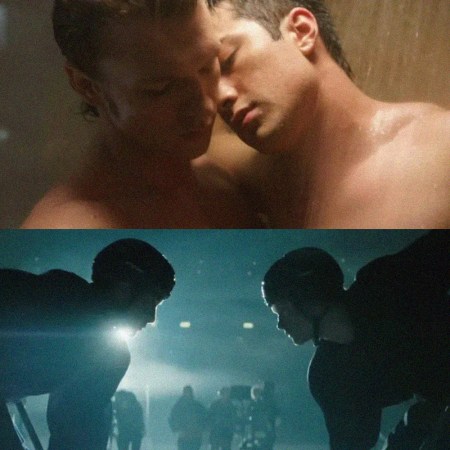Grill a steak. Change the oil. Throw a punch.
We’re all well versed in the lexicon of traditional “man skills”: they’ve been catalogued in the pages of men’s publications for decades, ours included.
But even the canon needs an occasional overhaul.
And so we present eight underrated skills to supplement the ones you already know, along with advice from experts on acquiring them.
Expect pickling tips, the one dance step you absolutely need to know and a Harvard professor’s notes on civil debate.
Up to you what you say when friends ask, “Where’d you learn that?”
Food
Old skill: Grill a steak
New skill: Salt preservation, aka pickling and fermenting
Expert: Joshua Witchger, Operations Manager at Brooklyn Brine
Why? “These days we’ve gotten so used to going to a grocery store and just picking what we want off a shelf. Pickling is something that is expansive and you can dive way into it, experience new flavors, find ways that the nutrients are enhanced and have a creative experience.”
What you need to know: The science of salt preservation dates back to ancient times, and for our purposes, comprises two similar but distinctive processes: salt fermentation and pickling. Says Witchger, “In salt fermentation, you’re getting a lot of live bacteria, so the nutritional value is enhanced and the flavors become more complex and funky. You can either make a salt brine (which is just water and salt) or something like sauerkraut or kimchi, where you’re throwing salt on your vegetables and with your hands pounding them to release their own native juices, and that becomes your brine. Whereas in pickling, we’re mixing water and vinegar and salt, and oftentimes sugar, garlic and other odds and ends to flavor things. It doesn’t require a whole lot of ‘knowledge’; as long as you have good, fresh produce and vinegar, it’ll go a long way in giving you creativity and good taste in your pickle.”
Where to learn more: “The Art of Fermentation by Sandor Katz. That’s one of my go-tos when I’m trying to learn new things. On Food and Cooking by Harold McGee is a classic.”
Social
Old skill: Console a crying woman
New skill: Intervene in cases of harassment
Expert: Emily May, Co-Founder and Executive Director at Hollaback!
Why learn? “66% of women have been harassed in public spaces and 81% wished someone had been there to help. When people are around, but do nothing, it makes the experience of harassment more traumatic which can have longer-term impacts like anxiety and depression.”
What you need to know: As May says, you don’t need to “strap on superhero spandex, swoop down and beat everyone up.” There are five better ways to intervene, that will keep you and the person being harassed safe. 1) Direct: Start a conversation with the target or find another way to draw attention away from them. 2) Delegate: Find someone in a position of authority (flight attendant, security guard, store manager) and ask for help. Check in with the person being harassed. You can ask if they want you to call the police. 3) Delay: Say, “Can I sit with you? Can I accompany you somewhere? What do you need?” 4) Document: Keep a safe distance. Film street signs or other landmarks that help identity the location. Say the day and time. 5) Direct: Call out the behavior directly and say: “That’s inappropriate.” You can also ask the person being harassed: “Are you okay? Should I get help? Should we get out of here?”
Where to learn more: The Hollaback! website as well as their app where you can read the experiences of others and document your own
Survival
Old skill: Build a fire
New skill: Maintain and secure your online identity
Expert: Brandon Ackroyd, Founder of Tiger Mobiles
Why learn? “It might seem like a hassle … but it’s far more hassle to clean up if your details are compromised. At worst, you’ll need to check your credit reports (potentially lock them), and trace what other accounts might be compromised — basically performing a full security audit.”
What you need to know: You don’t head into the wilderness buck naked just because you can, and same goes for your online exploits. Ackroyd suggests three essential tools: A password manager (LastPass, Dashlane or Trezor), two-factor authentication (Google Authenticator or Authy) and an anti-malware monitor with real-time protection (he uses Malwarebytes). His best practices include using a VPN when using public wifi (he uses ProtonVPN), showing as little as possible publicly on social media privacy settings and not using your primary phone number or email when signing up for accounts.
Where to learn more: “Anyone who is using cloud storage for sensitive information should consider locally encrypting files and folders. So if you’re a Dropbox user keeping passport scans, banking info, passwords, commercially sensitive work files, etc. on there, I would say you should definitely be encrypting locally first … If you further encrypt with Cryptomator (or Boxcryptor or Veracrypt) it’s a second line of defense.”
Intellect
Old skill: Win an argument
New skill: Debate political topics without polarizing anyone
Expert: Michael Sandel, Harvard University professor of political philosophy (via TED)
Why learn? “One thing the world needs, one thing this country desperately needs is a better way of conducting our political debates.”
What you need to know: Instead of debating the most recent policy, politician or tweet, take it to a deeper level. “There is a tendency to think that if we engage too directly with moral questions in politics, that’s a recipe for disagreement, and for that matter, a recipe for intolerance and coercion. So better to shy away from, to ignore, the moral and the religious convictions that people bring to civic life.” On the contrary, Sandel says, “… a better way to mutual respect is to engage directly with the moral convictions citizens bring to public life, rather than to require that people leave their deepest moral convictions outside politics before they enter. That, it seems to me, is a way to begin to restore the art of democratic argument.”
Where to learn more: Justice: What’s the Right Thing to Do? the book version of his lauded Harvard course “Justice,” which is also available for free online
On the Town
Old skill: Get a table in a restaurant
New skill: Dance the foxtrot
Expert: Dance instructors Aaron Mitchum and Kristina Reese (via Howcast)
Why learn? Leave flossing to your kids, waltzing to royalty and a grab bag of hokey novelty moves to those who don’t know better. You’ll be hearing songs like “You Make Me Feel So Young,” “Cheek to Cheek” and “The Way You Look Tonight” at parties for the rest of time, and guess what? Those, and just about every Sinatra tune, are foxtrot songs.
What you need to know: Aaron and Kristina illustrate the most basic step in their Howcast video, which for the men is as simple as walking forward with the left foot, then the right, then stepping to the left and bringing your feet together. Once the music starts, it’s one of the most intuitive styles. But the real key lies in your body frame, which tells your dance partner what to do — keep your elbows elevated and stretched, your shoulders down and a little resistance between you and your partner in the hands. Also, while online tutorials are good to get the gist, you can only truly learn by dancing with a partner.
Where to learn more: Your local dance studio, but preferably a ballroom dance group or classes that attract a younger crowd. Either way, the people you learn with now don’t matter as much as the people you dance the night away with later.
Cars
Old skill: Drive stick
New skill: Road trip in foreign countries
Expert: Etain O’Carroll, freelance travel writer, editor and photographer behind the Wild Atlantic Way itinerary in Lonely Planet’s book Epic Drives of the World
Why learn? Because relegating yourself to cabs, Ubers or even shotgun hobbles your adventures when traveling abroad. “Don’t let the fear of driving overseas stop you. It’s really not difficult and there are many rural areas you’ll only get to see with your own wheels.”
What you need to know: The obvious, but maybe not so obvious when you’re in a strange new country? Learn the rules of the road. The most important, according to O’Carroll: “What are the speed limits and are they in kilometers or miles? Who gets priority on roundabouts? What rules apply to traffic lights? (No turning on a red light?) What parking restrictions are there?” Some more nuanced advice, taking Ireland’s Wild Atlantic Way route (a good first jaunt) as an example: “Much of the WAW is narrow, winding roads with little traffic. Don’t get complacent as you wind around corners, you’ll often meet a tractor or a coach coming the other way, or sheep on the long acre (grazing on the grass verge on the side of the road). In rural Ireland on a narrow road, acknowledging people and cars you pass is very important, especially if they’ve made way for you. One or two fingers lifted off the steering wheel is enough to make you look like a local. If you’ve been driving on a quiet road for some time, remind yourself you should be on the left. If another vehicle comes towards you unexpectedly it can be easy to automatically veer right as you would at home.” Other important points include filling up the gas tank early in rural areas, setting realistic distance goals, not driving directly after a long flight, not making assumptions when drivers flash their headlights and observing dead end signs. As O’Carroll notes, “Tourists are notorious for getting stuck on narrow winding slipways to the sea on Ireland’s west coast.”
Where to learn more: “Do a quick search for the rules of the road online and driving tips for that country.” Also, “Buy a good OS (Ordnance Survey) map, GPS in rural areas is often inaccurate.” For inspiration, try Epic Drives of the World.
Outdoors
Old skill: Fell a tree
New skill: Know your local natural environment like the back of your hand
Expert: James Caroll, co-owner of Old Souls (field, stream, camp and home shop in Cold Spring, NY) with his wife Tara
Why learn? “The world today puts too much stock in knowing things that happen indoors. At the end of the day, we are all just another part of our environment and it pays more than any job could to know what’s going on with the natural world outside of your home or office.”
What you need to know: Pick up a map and compass, then seek out outdoor activities in your town outside your normal purview (Caroll prefers hiking and fly fishing). “It’s important to have an understanding of the weather and how it impacts your plans, and to have the right gear to take on whatever that scenario may be. It’s also important (maybe even more so) to understand how to navigate and get yourself out of the woods, possibly in the dark. A simple lesson in map reading and compass use is crucial, online tutorials are great for this … but Backpacker magazine offers a paid online course with Colorado’s Outward Bound that is a lot more in-depth.” He also suggests the Gaia GPS app.
Where to learn more: “One of the absolute classic books on the outdoors was written by a research-worthy character named Nessmuk, and is called Woodcraft and Camping.” He also recommends How to Stay Alive in the Woods, Catskill Rivers: Birthplace of American Fly Fishing and AMC (Appalachian Mountain Club) Catskill Mountain Guide.
Money
Old skill: Be a smart investor
New skill: Be an effective philanthropist
Expert: Jake Hayman, CEO of philanthropy education firm Ten Years’ Time (via Forbes)
Why learn? “Unlike in business where there are common models for effective practice, philanthropists tend to make it up as they go along — how can you go wrong giving money to charity?” As history and dubious charities have shown, there are many ways to go wrong.
What you need to know: Hayman details five key ways to make sure your money is doing the most good. First, become an expert in the cause you wish to assist. Second, instead of focusing only on money given or people impacted, think about discovery. Third, share agenda-setting power with the communities you’re serving. Fourth, use the strengths of philanthropic capital to your advantage. Fifth, give strategically and understand the economics of grant-making.
Where to learn more: Read Hayman’s full thoughts on Forbes. For what not to do, read Winners Take All: The Elite Charade of Changing the World.
Nota bene: Answers may be condensed for length. If you purchase through these links, InsideHook may earn a small share of the profits.
The Charge will help you move better, think clearer and stay in the game longer. Subscribe to our wellness newsletter today.
























